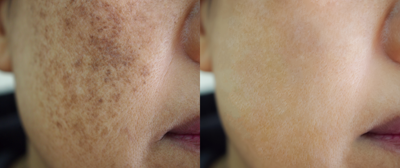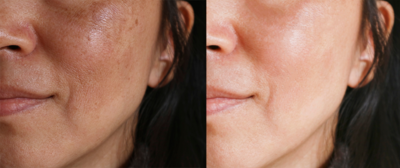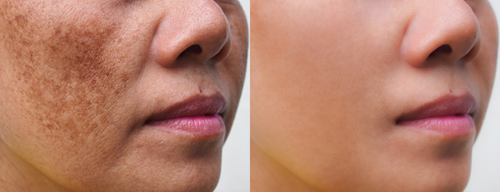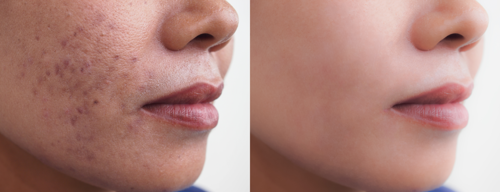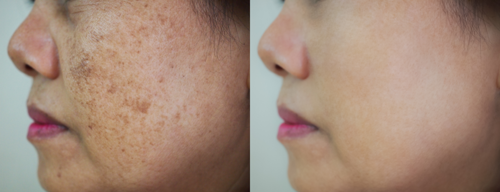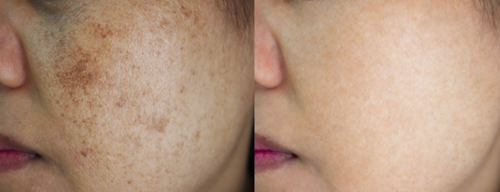Why choose SKIN111?
- From 442 AED (after discount).
- Free consultation with highly qualified and experienced doctors.
- Using only genuine and high-quality products from USA, UK, Italy and France, DHA / MOH approved, scientifically proven to be safe, effective, and reasonably long-lasting.
- Effective treatment tailored to your skin type.
- Voted amongst the top 6 Aesthetics clinic in the GCC in 2021, 2022, 2023 & 2024.
- Best Aesthetics clinic in Dubai, MEA business awards. 2022 and 2023.
- Offering the best prices for the quality of service and product.
- Free payment plan (0% interest).
- Luxurious Clinics Located in DIFC & Nakheel Mall - Palm Jumeirah.
- Trusted clinic with +2000 genuine google reviews (across Clinics) 4.9 Stars rating.
- Free valet parking, open every day 9am – 9pm.
- 40% discount with SKIN111 loyalty card.
Pigmentation / Hyperpigmentation
It refers to the natural coloring of the skin, which is primarily determined by the presence and distribution of melanin. There are various types of skin pigmentation, each with its characteristics and underlying causes:
- 1. Normal Skin Pigmentation : This refers to the natural color of the skin when melanin production is balanced and evenly distributed. Normal skin pigmentation varies among individuals and is determined by genetic factors and sun exposure.
- 2. Hyperpigmentation : Hyperpigmentation occurs when there is an overproduction of melanin, leading to darker patches or spots on the skin. Common types of hyperpigmentation include:
- Sunspots (Solar Lentigines) : Also known as age spots or liver spots, these are flat, brown spots that develop on sun-exposed areas of the skin due to prolonged UV exposure.
- Melasma : Melasma presents as dark, irregular patches typically on the face, particularly on the cheeks, forehead, chin, and upper lip. Hormonal changes, such as those during pregnancy or from oral contraceptives, often trigger melasma.
- Post-Inflammatory Hyperpigmentation (PIH) : PIH occurs after an inflammatory skin condition, injury, or trauma heals, leaving behind darkened areas. Common causes include acne, eczema, psoriasis, and skin injuries.
- 3. Hypopigmentation : Hypopigmentation occurs when there is a decrease or loss of melanin production, resulting in lighter patches or spots on the skin. Types of hypopigmentation include:
- Vitiligo : Vitiligo is a skin condition characterized by the loss of melanocytes, resulting in depigmented patches on various parts of the body.
- Albinism : Albinism is a genetic condition characterized by a lack of melanin production, resulting in very light or white skin, hair, and eyes
- 4. Drug-Induced Pigmentation : Certain medications, such as some antibiotics, antimalarials, and chemotherapy drugs, can cause changes in skin pigmentation as a side effect. This can manifest as hyperpigmentation or hypopigmentation, depending on the drug and individual response.
Treatments available to treat various kinds of skin pigmentation / hyperpigmentation / melasma:
During your consultation, the doctor will assess your skin type, the type and severity of hyperpigmentation you have, any underlying skin conditions, and factors such as your medical history and lifestyle. Based on this comprehensive evaluation, the doctor will recommend the most appropriate treatment options tailored to your individual needs and goals.
- 1. BBL (BroadBand Light) Clear : BBL uses intense pulsed light (IPL) to target areas of hyperpigmentation, such as sunspots, freckles, and age spots. The light energy is absorbed by the pigmented cells, causing them to break down and eventually fade away. BBL also stimulates collagen production, leading to overall improvement in skin tone and texture.
- 2. HALO : HALO is a hybrid fractional laser treatment that combines ablative and non-ablative wavelengths to target various skin concerns, including pigmentation irregularities. It works by creating controlled micro-injuries in the skin, stimulating the body's natural healing response and promoting the growth of new, healthy skin cells. HALO can effectively treat sun damage, age spots, and uneven skin tone.
- 3. Pico Laser : Pico laser deliver ultra-short pulses of energy to the skin in picoseconds (trillionths of a second). This rapid energy delivery shatters pigment particles without heating surrounding tissues excessively. Picosecond lasers are effective for treating hyperpigmentation, including stubborn pigmented lesions like melasma, with minimal downtime and risk of side effects.
- 4. MOXI : MOXI is a non-ablative laser treatment that targets pigmentation issues, as well as other signs of aging and skin damage. It delivers laser energy to the deeper layers of the skin, stimulating collagen production and triggering the body's natural healing process. MOXI is known for its minimal downtime and can improve overall skin tone, texture, and pigmentation irregularities.
- 5. Chemical Peels : Chemical peels involve the application of a chemical solution to the skin, which causes exfoliation and peeling. Depending on the strength of the peel, it can penetrate different layers of the skin to target pigmentation issues, such as sun damage and age spots. Chemical peel treatments work by removing the outer layer of damaged skin cells, revealing smoother, more evenly pigmented skin underneath.
- 6. Mesotherapy : Mesotherapy involves the injection of vitamins, minerals, antioxidants, and other active ingredients directly into the skin to target specific concerns, including pigmentation irregularities. The injected ingredients can help improve skin tone, reduce pigmentation, and stimulate collagen production. Mesotherapy is often used in combination with other treatments for enhanced results.
- 7. Erbium Glass Laser : Erbium Glass lasers emit wavelengths that are absorbed by water in the skin, causing controlled damage to the upper layers. This promotes collagen production and skin renewal. Erbium Glass lasers can effectively treat hyperpigmentation, including melasma, by targeting excess pigment and stimulating skin rejuvenation.
- 8. Fractional Laser : Fractional lasers create microscopic treatment zones in the skin, leaving surrounding tissue untouched. This promotes faster healing and reduces downtime compared to traditional laser resurfacing. Fractional lasers can target hyperpigmentation by breaking down excess melanin and promoting collagen remodeling, making them effective for treating conditions like melasma.
- 9. Innovyal Lightening Action : is an exclusive combination of Hyaluronic Acid associated with Tranexamic Acid & Niacinamide (Vitamin B3), designed for reducing the pigmentation caused by aging, sun exposure, acne scarring or hormonal influences.
- 10. IPL : IPL (Intense Pulsed Light) therapy can be an effective treatment for hyperpigmentation, depending on the type and severity of the pigmentation and your skin type. IPL works by delivering high-intensity pulses of broad-spectrum light to the skin, targeting melanin (the pigment responsible for dark spots) and causing it to break down.
SKIN111's medical professionals have the expertise and experience to provide personalized recommendations and develop a customized treatment plan that addresses your specific concerns. They may recommend a combination of treatments, including IPL therapy, topical skincare products, chemical peels, or other advanced procedures, depending on what will be most effective for your skin.
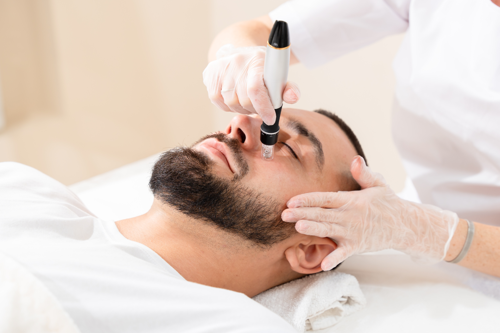
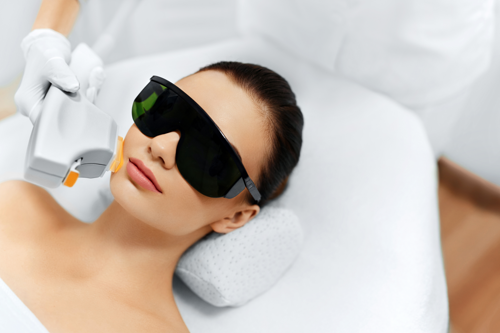
Benefits of skin pigmentation treatment
- Improved Skin Tone : Hyperpigmentation treatments help even out skin tone, reducing the appearance of dark spots and patches.
- Enhanced Confidence : Clearer, more uniform skin can boost self-esteem and confidence.
- Youthful Appearance : Hyperpigmentation treatments can address signs of aging, such as sun spots and age spots, giving the skin a more youthful appearance.
- Reduced Risk of Complications : Treating hyperpigmentation can reduce the risk of complications such as skin cancer, which may arise from prolonged sun exposure and UV damage.
Difference between pigmentation & hyperpigmentation
Pigmentation is a broader term referring to the coloring of the skin, hair, and eyes. It encompasses both hyperpigmentation (excess pigment leading to dark spots) and hypopigmentation (loss of pigment leading to lighter spots).
Who requires procedures in hyperpigmentation?
Individuals experiencing hyperpigmentation, whether due to sun exposure, hormonal changes, aging, or other factors, may benefit from procedures to address their concerns.
Hyperpigmentation specialists in Dubai
SKIN111 boosts a team of experienced dermatologists and skincare specialists who specialize in diagnosing and treating various forms of hyperpigmentation. Their expertise ensures tailored treatment plans for each individual's unique skin concerns.
Hyperpigmentation: FAQs
Does pigmentation go away fast?
The duration of treatment and the speed of results depend on the type and severity of pigmentation, as well as the chosen treatment method. Some pigmentation may fade quickly with topical treatments, while others may require multiple sessions of laser therapy or other interventions.
How can I prepare for hyperpigmentation procedures?
Preparing for hyperpigmentation procedures may involve avoiding sun exposure, discontinuing certain skincare products, and following any pre-treatment instructions provided by your dermatologist or skincare specialist.
What is the cost of hyperpigmentation treatment?
The cost of hyperpigmentation treatment varies depending on the type of treatment, the number of sessions required, and the clinic's location. SKIN111 offers competitive pricing for their hyperpigmentation treatment packages, tailored to individual needs and budget.
Is there a cream for skin pigmentation?
Yes topical creams like SKIN111 brightening and several other creams available for treating skin pigmentation, containing ingredients like hydroquinone, retinoids, kojic acid, and vitamin C. However, it's essential to consult with a dermatologist or skincare specialist to determine the most suitable cream for your specific skin concerns.
Hyperpigmentation before and after
